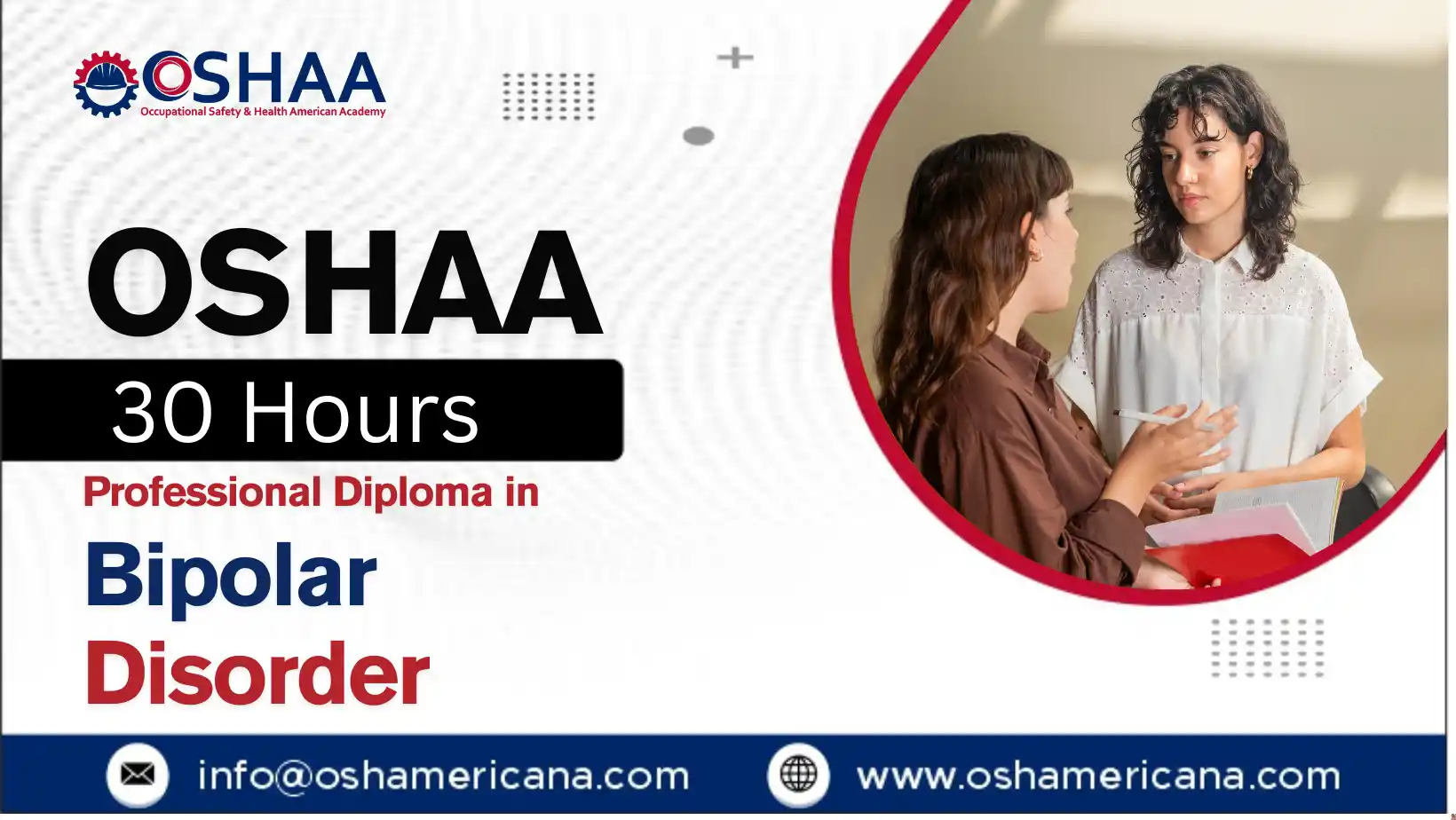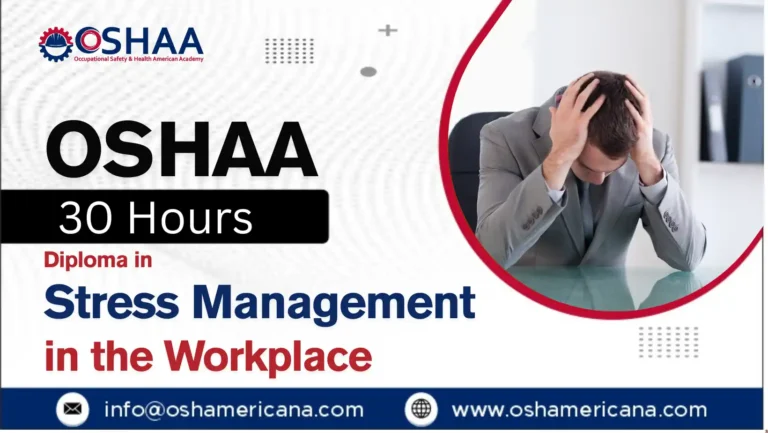Advance Your Career with the Professional Diploma in Bipolar Disorder
The OSHAA 30-Hours Professional Diploma in Bipolar Disorder is a specialised training programme designed to provide participants with a comprehensive understanding of one of the most complex and widely misunderstood mental health conditions. This professionally developed course equips participants with essential knowledge to recognise, manage, and support individuals living with bipolar disorder across various care and professional settings.
Bipolar disorder is a mood disorder characterised by significant shifts in mood, energy, and activity levels. These fluctuations can deeply impact relationships, employment, and day-to-day functioning. This diploma aims to improve awareness, promote early identification, and enhance intervention approaches by exploring the condition from clinical, psychological, and social perspectives. Participants gain valuable insight into the types, symptoms, causes, treatment options, and the lived experiences of those affected.
Over the course of 30 guided learning hours, participants will explore the nature of bipolar disorder, including bipolar I, bipolar II, and cyclothymic disorder. The programme covers diagnostic criteria, risk factors, co-occurring conditions, and current approaches to management. In addition to theoretical foundations, the course includes practical strategies for supporting individuals, promoting recovery, and reducing stigma in both clinical and community contexts.
The OSHAA 30-Hours Professional Diploma in Bipolar Disorder offers practical, evidence-based knowledge in a flexible format. Developed to meet UK standards, the course prepares participants to respond effectively to real-life situations and contribute to improved outcomes for individuals living with bipolar disorder.
Participants completing this diploma may progress to further study in psychology, mental health support, counselling, or psychiatric care. The course also enhances professional development for those pursuing roles in mental health services, advocacy, or wellbeing coordination.
OSHAA 30-Hours Professional Diploma in Bipolar Disorder
Study Units
Learning Outcomes
Introduction to Bipolar Disorder: History and Classification (3 Hours)
- Understand the historical background and evolution of bipolar disorder diagnosis
- Identify the key characteristics that define bipolar disorder as a mood disorder
- Describe the classification systems used in diagnosing mental health conditions
Types of Bipolar Disorder and Diagnostic Criteria (4 Hours)
- Distinguish between Bipolar I, Bipolar II, and Cyclothymic Disorder
- Understand the diagnostic criteria outlined in DSM-5 and ICD-11
- Recognise how different types of bipolar disorder present in clinical settings
Causes and Risk Factors: Biological, Genetic, and Environmental (6 Hours)
- Explain the biological and neurological factors contributing to bipolar disorder
- Understand the influence of genetics and family history in the development of the condition
- Evaluate environmental and psychosocial triggers that may affect mood stability
Recognising Symptoms and Patterns of Mood Episodes (4 Hours)
- Identify signs of mania, hypomania, and depressive episodes
- Understand the progression and duration of different mood states
- Recognise early warning signs and patterns that may indicate relapse
Treatment Approaches: Medication, Therapy, and Lifestyle Management (5 Hours)
- Understand the role of medication in managing bipolar symptoms
- Explore psychological therapies including CBT and psychoeducation
- Identify lifestyle interventions that support long-term mood stability
Co-Occurring Conditions and Differential Diagnosis (4 Hours)
- Recognise common co-occurring disorders such as anxiety, ADHD, and substance use
- Understand how bipolar disorder can be mistaken for other mental health conditions
- Apply knowledge to distinguish bipolar disorder from similar clinical presentations
The Impact of Bipolar Disorder on Daily Life and Relationships (2 Hours)
- Understand how bipolar disorder affects personal, social, and professional life
- Explore strategies to manage interpersonal challenges and support daily functioning
- Recognise the importance of support networks in recovery and well-being
Crisis Intervention and Suicide Prevention (2 Hours)
- Learn how to assess risk and respond during mental health crises
- Understand the signs of suicidal ideation and self-harm in individuals with bipolar disorder
- Apply appropriate crisis intervention techniques and know when to seek professional help
Course Benefits – OSHAA 30-Hours Professional Diploma in Bipolar Disorder
- Gain a thorough understanding of bipolar disorder, including its subtypes, symptoms, and diagnostic criteria
- Develop the ability to recognise early warning signs and mood episode patterns
- Understand the biological, psychological, and environmental factors influencing the condition
- Explore effective treatment options, including medication, therapy, and self-management strategies
- Learn to distinguish bipolar disorder from other mental health conditions and co-occurring disorders
- Enhance communication and support skills for working with individuals and families affected by the disorder
- Acquire practical knowledge for crisis intervention and suicide prevention in high-risk situations
- Improve professional competence for roles in mental health, social care, education, and community services
- Earn a recognised qualification aligned with UK professional standards in mental health education
- Build a foundation for further study or progression into specialist areas such as counselling, psychiatric support, or clinical research
The OSHAA 30-Hours Professional Diploma in Bipolar Disorder is designed for participants who are involved in or interested in supporting individuals affected by mood disorders. This course is particularly suitable for:
- Mental health professionals and support workers seeking to enhance their understanding of bipolar disorder
- Social care and community service workers who support individuals with mental health challenges
- Counsellors, therapists, and wellbeing practitioners working in clinical or educational settings
- Healthcare assistants, carers, and volunteers involved in psychiatric or general health services
- Educators, SEN support staff, and pastoral care workers interacting with individuals experiencing mood instability
- Individuals with a personal interest in mental health or those supporting a loved one with bipolar disorder
This course is ideal for participants aiming to gain practical, evidence-based knowledge to inform their professional practice or to support the wellbeing of others with greater empathy, awareness, and skill.







